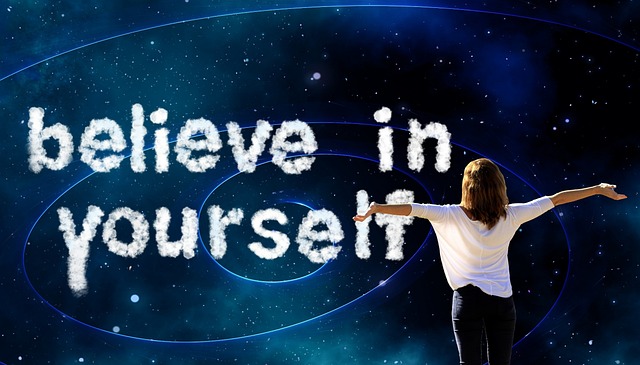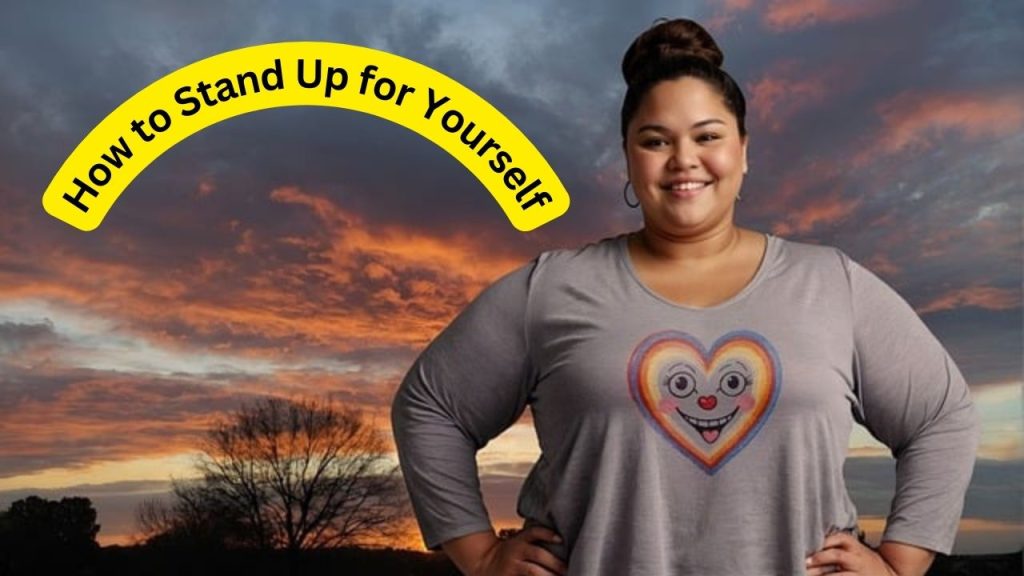Discover 7 powerful strategies to stand up for yourself and protect your boundaries. Learn how to assert your needs confidently, eliminate unnecessary justifications, and navigate challenging conversations with ease. Empower yourself today!
How to Stand Up for Yourself

Here’s a hard truth:
if you don’t advocate for yourself, nobody will. And if you don’t assert your needs, let’s face it, you will get walked over every single time. You’re not going to have to worry about that. We’re talking about how to stand up for yourself. I’m on a mission to make your next conversation the one that changes everything.
Knowing When to Stand Up for Yourself
The first thing to know about standing up for yourself is knowing when to do it. Because, number one, not everybody’s worth getting out of your chair for. It is a know-your-worth mentality, and we’re going to talk about exactly where you need to go in your mind leading up to these conversations.
Eliminate Verbal Disclaimers
Number two:
get rid of the verbal disclaimers. These are little statements you say before you say what you need to say, like “Hey, I’m sorry, but…” or “I just feel like maybe…” We’re going to talk about getting rid of those and how to do it.
Stop Justifying Your “No’s”
Number three: stop justifying the “no’s.” Stop feeling like you need to explain yourself on and on just because you turned somebody down. When you do that, it slowly takes away from your self-confidence, and I don’t want to see that.
You Don’t Have to Respond to Everything
Maybe nobody’s told you this, but just because somebody has said something, it does not mean that it requires a response from you. Just because they throw a pitch doesn’t mean you have to swing. You just let it go by. There’s this idea in our head that because somebody gave us an opinion, we have to give an opinion back. That’s just not true.
Don’t Justify Yourself to Everyone

When it comes to standing up for yourself, it is often the person that is not worth your time that you don’t need to give attention to. And often, that’s the exact opposite of what we do. We find ourselves trying to justify and explain to people that do not matter in our life—the people that rank low in our priority list—yet we feel like we have to prove something to them every single time that we talk. Eliminate that concern.
Not Every Conflict is Worth Your Energy
When people play chess, it’s expected that you’re going to take a pawn. Nobody freaks out about it, nobody loses their mind when somebody takes a pawn because they know the value is not the pawn. They can take a rook, okay. They want to take a queen—that’s different. Understand that there’s going to be lots of different conflicts in your life, lots of different conversations. They are not all the same. The feeling you get by talking with certain people, those friendships, where they rank in relationship to you—they’re not all the same.
Stop Attending Every Argument

So, what I want you to understand is: stop attending every argument that you’re invited to. Just because somebody gave an opinion and said something to you, you have the choice of just letting it go, saying, “That does not require any response from me. That is not worth my time.”
Know Your Worth Before You Speak
That’s why I say it’s a know-your-worth mentality. Before you stand up for yourself and feel like you have to say something, ask the question, “Is this person worth getting out of my chair for? Is this somebody that actually needs part of my energy?” Because there is a strength and a wisdom in conserving your energy, in protecting your peace. So, the next time that happens, I want you to go through that filter and ask yourself, “Is this person worth getting out of my chair for? Because I know my worth.”
Don’t Pick Up Garbage
And please understand that this goes for anything they say. Just because they spew out garbage does not mean we’re in the business of picking up trash. Let me say that again: just because they spew out garbage does not mean that you’re in the business of picking up trash. You can politely tell them where it should go, and it’s not going to be on you.
Protect Your Peace

So, understand that part of protecting your peace is knowing that what they’re saying is not worth your time. You take it, set it aside. Personally, what I do in my own life is I have a wastebasket, all right? I have a trash bag right next to me in my mind. And if somebody says something I don’t like, rather than feeling like I have to throw it back at them, I have to pick up that trash, that gross, nasty thing they said, and give it right back to them, I just take it, move it over, and put it in the trash. You can think of it like you’re sitting at a computer or a laptop: you just get it, drag it over, put it in the recycling bin, and then you delete it. You don’t have to worry about it, you don’t have to carry it.
Don’t Carry Other People’s Garbage
So understand, just because they throw out garbage at you does not mean that you’re in the business of picking up trash. When you have to advocate for yourself, part of that mindset is knowing how to go into it.
Jump into Assertiveness
Too often, there is hesitancy to say what you need to say. We treat it like it’s… I don’t know… what do they have, like, the cold plunge or a pool that’s filled with cold water? If you tiptoe into it, it’s much worse when you don’t say what you need to say right out of the gate, and instead you slowly walk into it with these little disclaimers, as I call them. It sounds like, “Hey, you know, I’ve just been… I just feel like I need to say this, I guess, and maybe I’m talking out of pocket here, but…” Have you ever said that before, where you say, “Ah, yeah, listen, I’m sorry, but maybe, you know, I’m just feeling like…?” You are trying to hesitate to say what you need to say, like you want to smooth it over, you want to hedge, to make sure nobody feels like you’re being too direct with it.
Be Bold in Your Communication

But when it comes to asserting yourself, when it comes to stating your needs, nobody’s going to do it for you. Remember, you’re the one that has to be bold and out in the open with it. So think of it as that cold swimming pool. If you walk right into it, it’s going to not feel great, it’s not going to look smooth, it’s not going to feel smooth. You either have two choices: you don’t say it at all, or you jump right in.
Jump Right In
When you see people doing the cold plunge, they don’t walk into it. They don’t slowly go into it. They put their whole body into it. So I want you to get used to the idea of, “I’m going to put my whole body into this thing. If I have something to say, I’m going to say it. I’m not going to feel like I have to apologize for it. I’m not going to feel like I have to be hesitant and hedged the whole time.” If it is something that is on your heart, and it is something that is truly asserting your needs in your life, you have one chance, one life, and this is it right here, for you to be able to state your piece, assert your needs, and say what you need to say.
Saying No with Confidence
Now, another part of this is, often when it comes to standing up for yourself, it happens in moments where you need to say no to something. You need to turn something down. Maybe somebody’s invited you to something, you got offered something, and you need to say no, but you don’t know how to say it, and you’re just not sure you can advocate for yourself to say no.
How to Say No

Now, we’re going to talk about how to say no to certain things, how to decline something and still be respectful, how to disagree and still be respectful about it, and those little bitty specific scenarios. Here’s the point I’m making with that: there are times when you have to say something, and they need to hear you say no.
The Difference Between No and No Because
There’s a difference between saying no and saying no because. For example, let’s say you ask me a question, and I just said, “No.” No versus “No, because you know I have that thing we talked about, and I’ve got to make sure I take care of this. It’s just been really busy lately, and I’ve been so stressed. You know, I have that other thing…” You see how it’s much weaker? All of a sudden, I’ve added three more sentences after the no, and I’ve slowly watered down the place where I need to assert my needs.
Eliminate the Need for Justification
If I need to say no to something, I need to say no. So, eliminate that habit of always saying, “No, because.” It’s just no. And if they need to ask other questions, they’re free to ask other questions, and you’re free to say no again.
Stand in Your Power
I want you to feel empowered, all right, on this idea that just because they ask me something does not mean I have to give them something. Just because they told me something does not mean I have to have an answer for it. Standing up for yourself means that you are in complete peace with who you are and your presence in the conversation. You know your worth, wherever you are in that conversation—or if there should even be a conversation at all.
Embrace the Power of “No”
So when you need to say no to something, understand that it’s not just about refusing a request—it’s about protecting your boundaries, time, and energy. Saying “no” empowers you to prioritize what’s important in your life without feeling guilty. It’s a simple word, but when used confidently, it reflects your self-respect and clarity about what truly matters to you. Embrace the strength that comes with it, knowing that every “no” you deliver is an affirmation of your values, your worth, and your right to make decisions that support your well-being.
Conclusion
standing up for yourself is essential for maintaining your self-respect and ensuring your needs are met. By embracing a know-your-worth mentality, eliminating verbal disclaimers, and confidently asserting your boundaries, you can navigate difficult conversations with strength and clarity. Remember, it’s not just about saying “no” but about doing so with conviction and without unnecessary justification. Protecting your peace and conserving your energy are crucial aspects of this process. With these strategies, you can turn every interaction into an opportunity to assert your worth and build healthier relationships.




